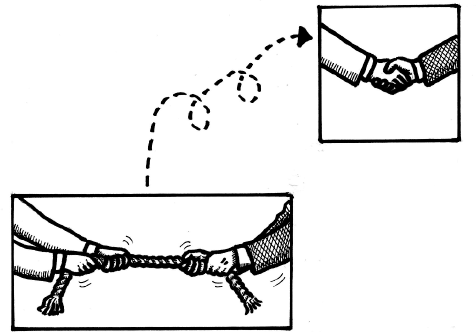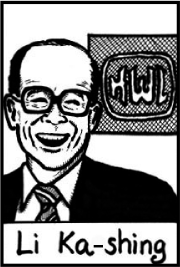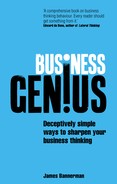The tenth Block and Limitation to Business Genius is naive negotiating.
And there are three main reasons for this:
- Firstly, people naively assume they’re much better at negotiating than they are …
(so they fall into the trap of thinking on their feet, when it would have been far wiser to plan ahead). - Secondly, people naively assume it’s smart to go straight for the specifics of a deal such as ‘how much?’ and ‘when by?’ …
(so they fall into the trap of depersonalising the whole process, when it would have been far wiser to find common ground first). - Thirdly, people naively assume the only way to negotiate is to play hardball …
(so they fall into the trap of turning every negotiation into a battle with a winner and a loser, when often it would be wiser to work in partnership with others to move towards a mutually beneficial outcome).
Ultimately, the key to Genius negotiating is do the complete opposite, and to plan, personalise and partner!
In a moment we’ll explore how.
Right now, however, there’s one critical point we need to mention:
Negotiating isn’t just one part of business: it is business
That’s why in Roman times the word negotiari meant ‘business’, because the marketplace was all about ‘settling or dealing by bargaining’.
And, by the way, just in case you think you’re not the negotiating type – because you’re not a high-flying lawyer, a highly committed Trade Union representative, or a highly influential rock ’n’ roll manager like Colonel Tom Parker (who secured a deal in the 1950s that turned Elvis into the highest paid entertainer in the world at the age of 22) – please think again.
Negotiating is something we all do, most of the time, for, as the Genius actor Meryl Streep once said, raising a family is just one great ‘enormous negotiation!’
OK, now we’ve got that out the way, let’s focus on the art of negotiation itself. Please bear in mind, however, that what we’re looking at here is principled negotiating, or what Leigh Steinberg – author of Winning With Integrity: Getting what you’re worth without selling your soul – calls ‘non-confrontational negotiating’.
(Obviously, in some parts of the world, where negotiating involves saying things like, ‘We can’t guarantee your safety if you don’t sign on the dotted line’ or ‘Nice restaurant you’ve got here. Maybe you want to keep it that way?’, it’s a totally different story.)
Anyway, if it’s a win-win you’re after, here’s a deceptively simple framework that can help. Before you enter into any negotiation, make sure you’ve already worked out your answers to these four questions:
- What would be a fantastic outcome?
(i.e. in an ideal world, what would you most love to walk away with?) - What is the most feasible outcome?
(i.e. in the cool light of day, what do you think is most likely to happen?) - What would be a fundamental outcome?
(i.e. how low are you fundamentally prepared to go?); and finally - What is your FOGG?
(this one’s a bit odd, but simply refers to Phileas Fogg – the intrepid adventurer in Jules Verne’s 1873 classic Around the World in Eighty Days – because, in the heat of the moment (if you’re about to say yes to a deal that’s even worse than your fundamental position), how are you going to escape in your equivalent of a hot-air balloon?)
Harvard negotiation experts Roger Fisher and William Ury – authors of Getting To Yes – call this last one your ‘best alternative to a negotiated agreement’ and, to be honest, it can involve anything from ‘buying time’ (e.g. ‘I need to consult my boss on this before making a final decision’) to perhaps even walking away (especially if there are other business opportunities you’ve already started to explore).


UP! YOUR NEGOTIATION SKILLS
NUGGET
One of the most successful Asian businessmen of recent times is Hong Kong’s Li Ka-shing (otherwise known as the ‘Warren Buffet of the East’).
As business author Anthony Scaramucci makes clear in his book Goodbye Gordon Gekko: How to find your fortune without losing your soul, however, Li Ka-shing’s success might never have happened if it hadn’t have been for his Genius negotiation skills.
This is best summed up in the advice Li Ka-shing once gave Scaramucci:
‘Leave money on the table for your partners. Not only will you be very rich, you will be very happy. If you allow your partners to benefit from the deal, they always come back and want to do business with you. There will never be a shortage of opportunity.’
So, if you want to UP! your negotiation skills, please be mindful of how there’s often a lot more to Genius negotiating than squeezing ‘for the last nickel’, time and time again.
Similarly, as Scaramucci writes, it’s important to remember that capital is not only about ‘cash, stocks and real estate’: it’s also about things like human capital, too, whereby (to be long-term Business Geniuses) we need to trust that our actions with others are ‘worthwhile no matter what the return’ might be.


USEFUL TIPS AND
ESCAPE STRATEGIES
If you want to UP! your negotiation skills, here are three practical tips and strategies that may help:
1 PICTURE NEGOTIATING POSITIVELY
For years now, when I’ve run advanced negotiation skills programmes, I’ve invited small groups of people to picture what they think negotiation looks like. And the variety is often striking.
Some picture, for example, a tug of war (as I pictured earlier). Others see it as a game of chess (like a strategic mind game); a game of cards like poker (where it’s all about bluff and double-bluff); or a dance (where ‘it takes two to tango’) or a sport (where there needs to be a ‘level playing field’).
The point being, often how we ‘see’ negotiation will influence how we go about negotiating.
So, if you’re keen to excel in this area, choose imagery that helps you rather than scares you away.
After all, why can’t mental pictures of negotiation be collaborative, rather than competitive, like a bridge, a rainbow, or a voyage of discovery?
And, if the last suggestion sounds a bit twee, here’s a thought:
Chris Voss – an ex-FBI specialist in hostage negotiations – states: ‘A negotiation is really a discovery process for both sides. That’s one of the reasons that really smart people have trouble being negotiators – they’re so smart they don’t think they have anything to discover.’
2 REMEMBER EACH ‘WAYNE’
Why is it that the young actor Marion Morrison had absolutely no say in his name being changed to John Wayne back in 1930? Well, back then, the legendary cowboy was simply a prop boy working with Fox Studios and, in the eyes of the movie director Raoul Walsh and studio head Winfield Sheehan, there were plenty of other aspiring actors who’d have jumped at the chance of being in the movie The Big Trail if he kicked up a fuss. In other words, they called the shots!
Compare and contrast this, however, with a very different Wayne (i.e. the England football striker Wayne Rooney). Why is it that his agent was able to secure him a new £300,000 a week deal with Manchester United in early 2014? Well, because Rooney was in such hot demand as a top goal scorer, there was no shortage of other teams queuing up to poach him, so Manchester United had little choice but to give him what he wanted. In other words, he called the shots!
Now, on the face of it, you may well be thinking, so what? Of course it’s easier to negotiate when you’re in a strong position, with plenty of leverage.
The key purpose of sharing the two Waynes example with you, however, wasn’t that.
It was simply to show how both John Wayne and Wayne Rooney ended up walking away with good deals (as did Fox and Manchester United), in spite of them experiencing totally different types of negotiations.
In other words, had John Wayne insisted on clinging on to the name Marion Morrison, or said no to the lead role in The Big Trail (unless they changed it back again), would he have gone on to become such a silver-screen idol, and to star in 170 movies? Don’t think so.
So, please remember this within the context of your own business negotiations. Sometimes (though not always) it can pay to lose a little, to gain a lot, further down the line …
3 MAKE, DON’T WIN
Finally, according to Tim Hindle in his book Negotiating Skills, it’s important to recognise that ‘a deal is made, not won’.
Or, to put it another way, as Brian Finch writes in 30 Minutes … To Negotiate a Better Deal, ‘The question “Who won?” is a meaningless one. If you achieved your objectives then you won, and why should you care if the other person won, too?’

BUSINESS GENIUS IN ACTION:
NEXT STEPS …
In summary, if you want to UP! your negotiation skills, here’s how:
- Pinpoint why it’s so important to plan, personalise and partner (to avoid falling into the traps of thinking on your feet, zooming straight ahead to dissect the data and playing hardball in every situation).
- Investigate how negotiating is something we all do, day in, day out (for this can help us to picture business negotiations more positively rather than assuming that only a small handful of people can do it, or do it well).
- Leverage the power of principled negotiating (because it’s often possible to get what you want without losing your soul).
- Orchestrate a plan for using the four Fs (for the clearer you can be about what fantastic, feasible, fundamental and FOGG mean to you – in advance – the easier you’ll find it to walk away with the deal you want).
- Target making a deal (recalling Brian Finch’s advice that ‘a deal is made, not won’).
And remember movies and football and the two Waynes!
